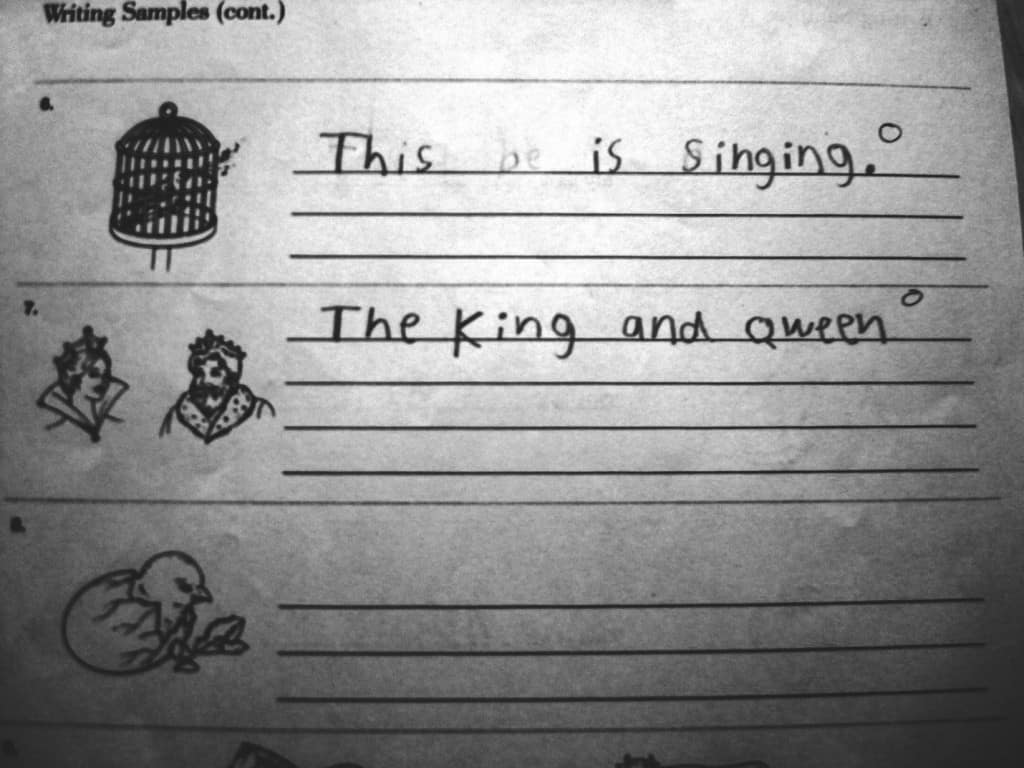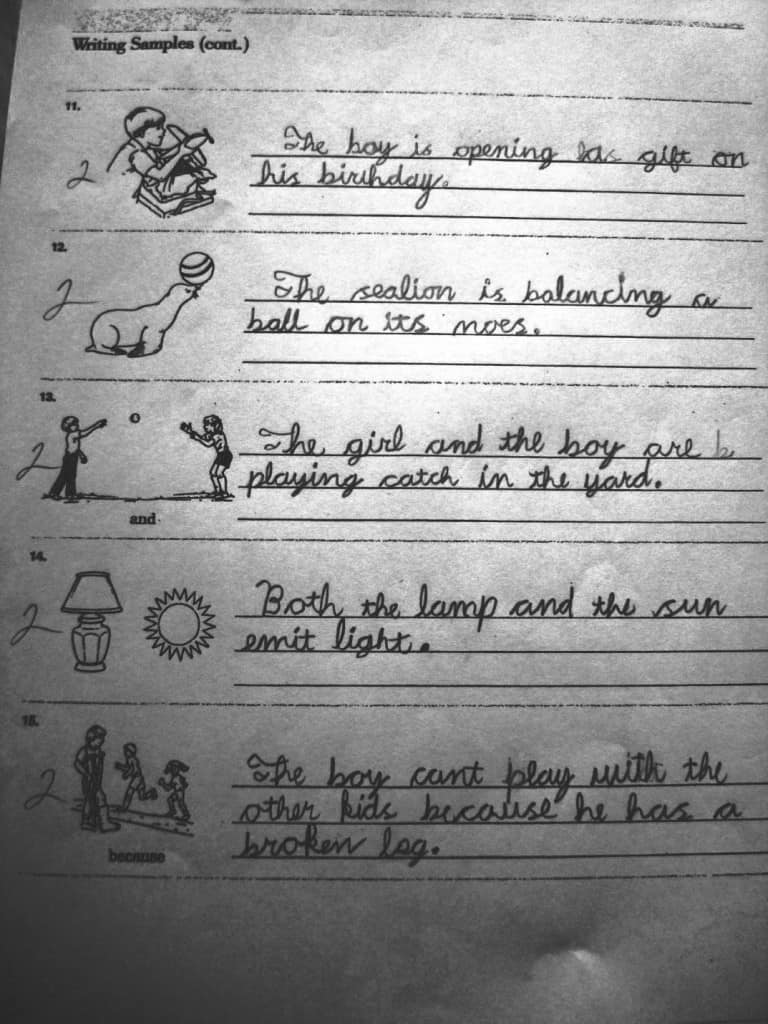Associate’s Name & Discipline:
Diane Geerlinks, ECE-DH; National Institute for Learning Development (NILD) Certified Educational Therapist, Ontario, Canada
Client Background:
“R” is a 14-year-old male who is diagnosed with Reading and Written Expression Disorder and Auditory Processing Disorder.
R was a full term baby but, due to a difficult forceps delivery, had significant neck and back issues which also affected sleeping and crawling. R’s psycho-educational assessment indicated much variability among the four indexes of the Wechsler Intelligence Scale for Children – high average in Verbal Comprehension and Perceptual Reasoning; low average in Working Memory and Processing Speed. He is home schooled. Academically, R scored between two and four grade levels below his age in reading, writing and fluency. Additionally, R’s parents noted that their son is a very anxious teen who is easily distracted and easily frustrated.
Presenting Problem:
In the initial consult with R and his mother, it was obvious that R could hold an intelligent conversation, but he broke down in tears when asked to write a simple sentence. His mother reported that due to his anxiety, it was very difficult to get him to come to the appointment. His anxiety led to struggles and frustration between his mother and him, especially around the school basics – reading, writing and math.
Therapeutic Goals:
Improve emotional regulation and academic skills, specifically in decoding, encoding and written expression.
iLs Program:
In March, R began a 60-session program combining the Sensory Motor Program (20 sessions) with the Concentration & Attention Program (40 sessions) using the iLs Total Focus system at home five times a week.
In September, R continued with a home/clinic combo of Reading & Auditory Processing and Optimal Performance II Programs at home three times a week, and in the clinic two times a week. The iLs Interactive Language Program was used during clinic sessions to improve auditory memory and proficiency in reading aloud.
Other Interventions:
R began Educational Therapy at our center a few weeks after beginning his first iLs program. Sessions were scheduled twice a week for 80 minutes. Education Therapy targeted reading, language processing, spelling and math fluency.
Summary of Changes:
At the end of one year of therapy and two iLs programs, R has made significant improvements:
Anxiety – The changes in R’s self-esteem and confidence was noted by his parents, the therapist and R himself. It is clear that R’s anxiety issues were affecting his academic and social development. After a few sessions of his first iLs program, R reported that he could complete his homework on his own, without parent involvement.
By the end of the second iLs program, which was integrated with NILD Education Therapy, R could complete “timed” activities without a breakdown. His mother reported that he was calmer at home and could self-regulate when stressful situations arose.
Reading – From March 2012 to May 2013, R’s independent reading scores improved from Grade 4 to Grade 9 in Oral Reading and from Grade 5 to Grade 9 in Silent Reading (Ekwall/Shanker Reading Inventory).
Writing – During R’s initial screening, he scored at Grade 1.5 in the Writing Samples Test of the WJ-R. He couldn’t put a single thought into a written sentence, let alone spell the words. One year and two months later, he could write complete sentences in cursive at a Grade 9.4 level.
Parent Comments:
Our son was a relatively happy child until we started homeschooling him and enrolling him in various extracurricular activities when he was of school age. His academic struggles and problems with team sports, etc. became obvious relatively quickly, but we were hoping that he would outgrow these problems by providing him with a safe and encouraging homeschool environment, along with participation in individual sports and involvement in a homeschool co-op. He was relatively calm as long as he was in a “safe” environment; however, he would panic and shut down – literally become incapable of participating in any new activities. He was very aware of his academic struggles and intelligent enough to know that he needed outside help, but his anxiety about being assessed and working with a tutor was so strong that he would have a complete meltdown whenever we would discuss this with him.
When I met with NILD Therapist, Diane Geerlinks, I was close to a burnout and really did not know what to do. My worries about my son’s future kept me up at night and working with him on a daily basis left me completely drained, not to mention the effect all of this was having on our whole family. At that point, I was willing to try almost anything, and learning more about iLs and NILD, as well as feeling an almost instant connection with Diane, I decided that I would somehow make my son get into the car to meet with Diane. It was this meeting that literally changed our lives.
He has gone from being an insecure and extremely anxious 14-year-old boy to a confident and relatively calm teenager in a very short period of time. He has recently started a high school co-op placement, something he would never have been able to handle just a year ago. He still occasionally has some anxiety issues, but the episodes are much shorter and he has developed a sense of awareness when this happens, and is learning how to cope and calm himself down. We are truly thankful!
Conclusions and Recommendations:
The combination of NILD Educational Therapy and iLs was a very effective treatment plan for this client. In general, R has become a much more self-confident teenager, and will initiate his own “calming” sessions when he becomes agitated. He recently began a high school co-op placement with a local computer business, doing repairs.
R is presently completing another iLs “boost” in clinic for the Fall 2013, using the Pro System. We will continue to use NILD Educational Therapy techniques to boost his working memory and processing speed weaknesses.
Comments by Ron Minson, MD, iLs Clinical Director:
The main issue here is the incapacitating anxiety that has interfered with this young teenager’s ability to learn and to get help. It is clear that he has difficulty with reading, being several years behind grade level, and with both verbal and written expression (personal communication). He was unable to go to the clinic for help, so the educator wisely took the help to him. He did 60 sessions of a home-based iLs program that reduced his anxiety to a level where he could enter a facility-based program to address his specific learning deficiencies.
Even though iLs has been shown repeatedly to be very effective in improving the underlying causes of learning, I cannot express strongly enough how frequently therapists comment on the reduction in anxiety that allows learning to take place. Anxiety adversely affects attention, concentration, memory and retrieval to underscore just a few of the cognitive skills necessary for learning. Once the anxiety was diminished, he could access his innate intelligence for learning and to take advantage of the help for academic progress from his educational therapist.
One of the major struggles for R was an inability to get his ideas out in writing even when he knew what he wanted to say – a fairly common problem actually. The interhemispheric transfer of information for this skill was facilitated through iLs and the educational therapist together. Looking at the writing samples, not only is there a remarkable improvement in writing, from immature printing to mature cursive, but also a rather stunning improvement in his written expression. The written samples speak to an intelligent and rich inner life. How wonderful that he can now demonstrate this to the world.
Handwriting Samples:
March 2012
May 2013






 © 2025 Unyte Health US Inc.
© 2025 Unyte Health US Inc.